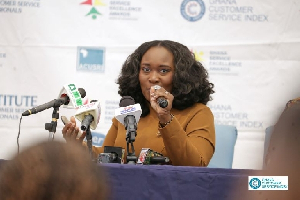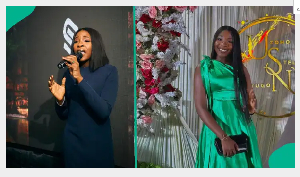Over the past several weeks, the Ghanaian public has been asking the
country's journalists a pertinent question - "Should rumors be published
in the media?" The question stems from the events caused by a
publication in a pro-government private newspaper, the Accra Daily Mail,
that a senior journalist had received 125,000 dollars in suspicious
circumstances.
"When is a rumor a story and when is story a rumor?" one curious public
official asked. "Should journalists public rumors? Should they publish
material, which they are still investigating?" he continued. The
hullabaloo started when the Accra Daily Mail, in a front-page story,
claimed, "the senior echelons of the Ghanaian media were awash with
rumors concerning a senior member who has been exposed by a close
associate." The story claimed that the person, who "is not generally
known for solvency, has recently been discovered by a close associate to
be in possession of 125,000 dollars in cash."
According to the newspaper, a senior journalist "recently gave the wife
of a close associate a box to keep. The associate was not at home then.
On his return, his wife pointed at the box and said Mr. X said she
should give it to him for safe keeping.
"A little later, he was overcome by curiosity and decided to peek into
the box to make sure what the content was. To his amazement and shock,
he saw wads of dollars staring at him. Inexorably, as if hypnotized, he
set about counting the money. He counted 125,000 in mostly 100 dollar
notes." When the friend came to claim the box, and he was asked whom
the money was for, he explained that someone was investing in his business.
The executives of the Ghana Journalists Association were not amused by
the story. They asked their Ethics Committee to get down to work and
clear the air. But in as much as they have tried to get the Editor of
the newspaper, Haruna Attah to clear the air, they have drawn a blank.
The Editor said he could not attend a first meeting to face the Ethics
Committee. When he eventually came, he said he could not disclose the
names of the persons involved. He would do that only if the committee
Ethics Committee would regard the disclosures as confidential and would
not pursue the information given. It said its investigations were still
continuing. The Committee refused to accept the condition pointing out
that an Ethics Committee operated on its ability to act on information
received.
For its conclusion, the Committee said the matter of the 125,000 dollars
remains a rumor. It, however, advised Attah that in the interest of the
public and of the profession of journalism, he should come out as soon
as possible with an acceptable conclusion to end the speculations on the
story. The speculations have turned into an explosive media war between
senior journalists. Kwesi Pratt, a fiery socialist politician who is
editor of the "Weekly Insight," has publicly written to Attah to name
the name as callers into a phone-in radio programs, and had mentioned
his name as the one who has received the money. "To end the assault on
my reputation, I request that you either publish the name of the senior
journalist involved or state publicly that I am not the journalist your
newspaper refers to." Attah would not budge. He made matters more
confusing when he again published that the money was not meant to invest
in business but "to propel his stature in a political party."
Members of the public have been uncomfortable with the style of
journalism in the country where innocent people have been attacked and
their reputation soiled, only for the stories to be found to be untrue.
The National Media Commission said it is happy that more and more
members of the public have been using their mediation committee to
resolve differences with the media, but that is also a cold admission
that more and more people are being hurt by the publication of unchecked
stories.
The National Reform Party in a communiqu? released this week must have
spoken for many people when it said the media was "going through a
period of self-discovery and turmoil..." The Party noted, "Many
ordinary citizens are worried that our media are becoming increasingly
irrelevant to our development process. The core concern appears to be
that the media increasingly reflect the mostly political concerns and
views of only a small section of society." It is a concern that in the
service of these narrow interests, factual reporting is giving way to
ideological "propaganda."
Many people have said the Ghanaian media is boring. Although there are
many publications and radio stations, the slant is terribly skewed
towards politics, and in the politics, it is the publication of rumors
whose objectives one can only guess.
Clearly, the Ghana Journalists Association and its Ethics Committee have
work to do, not only on the 125,000-dollar rumor story, but other
reports in a similar vein.
General News of Wednesday, 6 November 2002
Source: AA/Corrections by McKinley High












